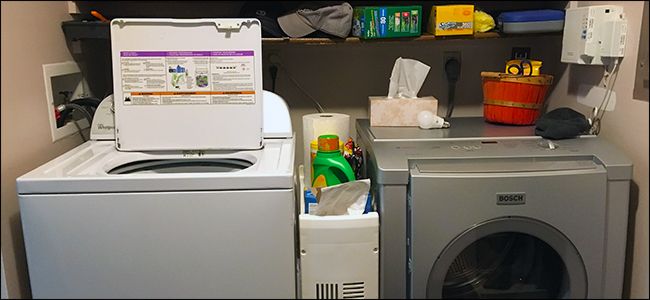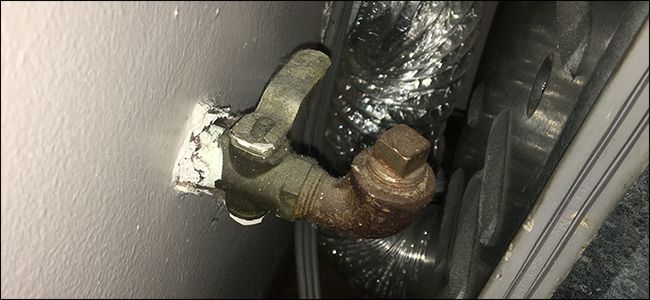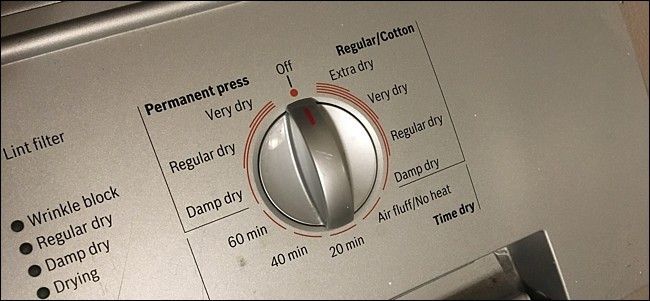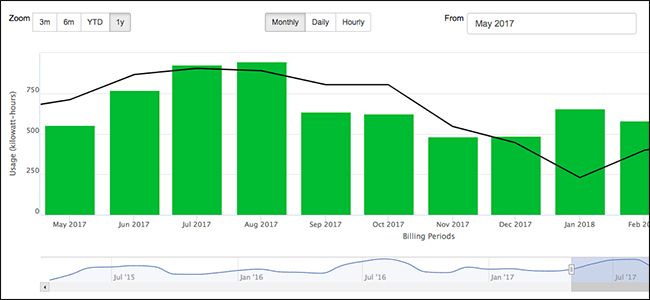Quick Links
You know how much electricity you use overall each month, because you pay the bill. But, you can also figure out how much electricity each appliance uses individually and how much it contributes to your total usage.
Unless you have some fancy equipment monitoring every electrical connection in your house, you likely have no idea what the energy usage is of individual appliances. Your monthly bill shows you your overall usage, but that's it. However, you can get a general idea of how much electricity your appliances use by looking at overall averages, calculating your usage, and, in some cases, using a nifty electricity monitor called the Kill A Watt if you want to do your own investigating.
Check Whether It's an Electric or Gas Appliance First
Before we get started, it's important to first check whether your appliances run off of electricity or natural gas (in some houses there's also propane or oil for heating, but for the vast majority of residences, you'll have electric and gas connections).
Appliances like your water heater, oven, stove, furnace, and clothes dryer could very well be powered by natural gas instead of electricity. One easy way to find out is by looking behind the appliance (or sometimes just right in front, like on your water heater) at the connections.
If it's clearly plugged into an electrical outlet, then you know it runs off electricity. However, if you see a flexible, corrugated hose of sorts (it will most likely be bright yellow) connected to a shut-off valve (like the one pictured above), then the appliance runs off gas.
If you have appliances that run off of natural gas, then you're actually in luck money-wise, as the cost of natural gas is around two to three times cheaper than the cost of electricity. However, if most of your appliances use electricity, it's important to know just how much they're using, since your electric bill can be one of your biggest utility expenses every month.
How Much Does Electricity Cost?
The cost of electricity varies depending on where you live and who your electric company is. You can usually find out the rate you pay for electricity by looking at your electric bill, going to the electric company's website, or calling them up and asking.
How much you pay for electricity is measured by the kilowatt-hour (kWh), and the average cost is anywhere between $0.09-$0.15 per kWh, sometimes more and sometimes less depending on your location. But what's a kilowatt-hour exactly?
A kilowatt-hour is measured by taking the power consumption of an appliance (in kilowatts) and multiplying it by how long it's been operating (in hours). So for example, a space heater that runs on 1,000 watts of power (or 1 kilowatt) and is on for two hours has used 2 kilowatt-hours of electricity. If it was only on for a half-hour, then it used up 0.5 kilowatt-hours.
How Much Electricity Do My Appliances Use?
It's the million-dollar question! Or at least it's the $114.56 question if you looked at my most recent electric bill. Your large home appliances are some of the most energy-hogging devices in your house, so it's always a good idea to know how much they're costing you.
Keep in mind that the cost largely depends on the age of the appliance (newer usually means more energy efficient), how much you use it, and how high or low your electricity rate is in your area---the cost of running your refrigerator may be much higher or lower than someone else, for instance.
With that said, below is a quick breakdown of some common household appliances and the average cost of operation per month, based on a $0.11/kWh rate and typical usage around the house.
- Refrigerator: $5.61 per month (depending on age of appliance)
- Microwave: $0.35 per month (based on 5 min. per day)
- Oven & Stove: $5.85 per month (based on one hour of mixed use per day)
- Dishwasher: $5.24 per month (based on one load per day)
- Clothes Washer & Dryer: $18.30 per month (based on one load per day)
- Central Heating/Cooling: $49.50 per month (based on 150 hours of runtime per month)
- Water Heater: $48 per month
You can check out the full chart that we referenced, which includes a lot more items like TVs, computers, and more. Again, some of your appliances may run off of natural gas instead of electricity, so you can expect to pay less on average compared to electric costs.
(Editor's Note: The original chart this article referenced has been taken down. Here's an archived copy.)




